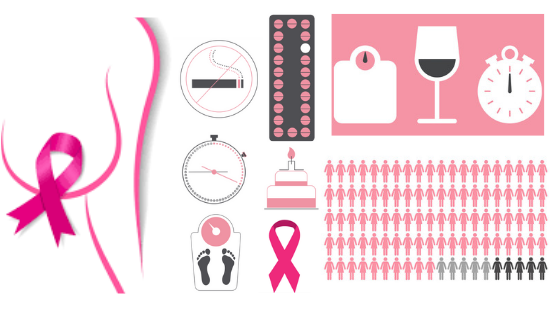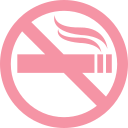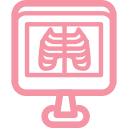Breast cancer is the number one cancer among Indian women with a rate of occurrence as high as 25.8 per 100,000 women and mortality of 12.7 per 100,000 women. In 2018, 1,62,468 new cases and 87,090 deaths were reported due to breast cancer in India. There were over 2 million new cases globally in 2018.
There are many different factors that can affect one’s chances of getting breast cancer. There’s no one single reason – it results from a combination of the way we live our lives, our genes, and our surrounding environment. There are some risks that one, unfortunately, can’t change, but then there are others that one can do something about.
The information in this article is based on the latest research evidence available on PubMed and was reviewed by experts in the field and by members of the public by Breast Cancer Now, the UK’s largest breast cancer research charity.
You may have heard about other things linked to breast cancer risk such as deodorants, certain foods or chemicals in the environment. There’s no evidence that these things affect your chances of developing breast cancer. You may also come across stories in the media that claim other factors also alter your chances. It’s important to be cautious about these stories as they may not be supported by strong evidence.
THINGS WE CAN CHANGE
By making small healthy changes in our lifestyle, we can lower your chances of getting breast cancer. This is no guarantee, but leading a healthy lifestyle does give a better chance.
 STAY ACTIVE
STAY ACTIVE
We can benefit from any activity that makes us breathe harder and get warmer. The key is to remain physically active and exercise on a regular basis. Being active can also reduce our risk of other conditions like heart disease, diabetes and stroke, as well as improving the mood and reducing symptoms of depression.
 KEEP A CHECK ON WEIGHT
KEEP A CHECK ON WEIGHT
After the menopause, our risk of breast cancer increases if we are overweight or obese, and the more weight we gain in your life, the higher our risk. We should strive to eat a balanced and varied diet rich in fruit, vegetables, pulses and whole grains and should try to avoid red meat, fatty and junk food, as much as possible.
 LIMITING ALCOHOL INTAKE
LIMITING ALCOHOL INTAKE
Drinking alcohol regularly increases our risk of breast cancer, and the more you drink, the greater the risk. If one drinks over the recommended amount, cutting down can have many positive health effects.
 QUIT SMOKING
QUIT SMOKING
If one smokes, quitting could help to lower the risk of breast cancer. There is growing evidence from several recent studies that smoking slightly increases your chance of developing breast cancer.
 PREGNANCY AND BREASTFEEDING
PREGNANCY AND BREASTFEEDING
Overall, having children means your risk of breast cancer is lowered in the long term. Your risk becomes lower the more children you have and the earlier you begin your family. The longer one breastfeeds, the more the risk is lowered. Similarly, the instances of breast cancer are more prevalent among working couples who do not start their families early enough.
THINGS WE CANNOT CHANGE
Unfortunately, there are some things affecting your risk of breast cancer that we can’t do anything about. The earlier breast cancer is diagnosed, the better the chance of getting successful treatment. So it’s also important to be checking our breasts regularly and to attend our breast screening appointments.
 WHEN YOUR PERIODS STARTED & MENOPAUSE
WHEN YOUR PERIODS STARTED & MENOPAUSE
One’s chance of developing breast cancer is slightly increased if their periods started at an early age. This may be because one was exposed to the naturally occurring female hormone estrogen for longer. Similarly, the later one goes through the menopause, the higher their risk, but this increase in risk is small.
 A FAMILY HISTORY OF BREAST CANCER
A FAMILY HISTORY OF BREAST CANCER
If one has a family history of breast cancer, this means one has a higher than average chance of developing the disease. Of all women with breast cancer, around 1 in 10 approximately have a family history.
 HORMONE REPLACEMENT THERAPY
HORMONE REPLACEMENT THERAPY
Hormone replacement therapy, or HRT, is a treatment used to relieve the symptoms of menopause by increasing your estrogen levels. The longer one uses it, the greater their risk of developing breast cancer.
 CONTRACEPTIVE PILLS
CONTRACEPTIVE PILLS
Taking the combined contraceptive pill slightly increases one’s risk of breast cancer – but within a few years of stopping, this risk disappears. Most women who use the pill are in their late teens, twenties and early thirties. If you’re under 35, breast cancer is rare, so it’s important to consider this when you’re deciding whether to take the pill.
 BREAST DENSITY
BREAST DENSITY
Breast density is the amount of breast tissue compared to fat tissue in your breasts. If one has a high amount of breast tissue compared to fat, they have a ‘high breast density’, which increases the risk of breast cancer.
 BENIGN BREASTS
BENIGN BREASTS
Our chance of getting breast cancer may be higher if we have a benign (non-cancerous) breast condition, where the breast cells are growing quickly, described as ‘proliferative’.
 X-RAY
X-RAY
Having x-rays to the chest area can increase your chances of getting breast cancer, but the risks associated with most x-rays are very small.
If you are worried about any of the breast cancer risk factors mentioned here you should discuss your concerns with your doctor. They will be able to give you more information and advice and help you to make the best choice for you. It’s important to regularly check your breasts for any unusual changes.

 STAY ACTIVE
STAY ACTIVE KEEP A CHECK ON WEIGHT
KEEP A CHECK ON WEIGHT LIMITING ALCOHOL INTAKE
LIMITING ALCOHOL INTAKE QUIT SMOKING
QUIT SMOKING PREGNANCY AND BREASTFEEDING
PREGNANCY AND BREASTFEEDING WHEN YOUR PERIODS STARTED & MENOPAUSE
WHEN YOUR PERIODS STARTED & MENOPAUSE A FAMILY HISTORY OF BREAST CANCER
A FAMILY HISTORY OF BREAST CANCER HORMONE REPLACEMENT THERAPY
HORMONE REPLACEMENT THERAPY CONTRACEPTIVE PILLS
CONTRACEPTIVE PILLS BREAST DENSITY
BREAST DENSITY BENIGN BREASTS
BENIGN BREASTS X-RAY
X-RAY